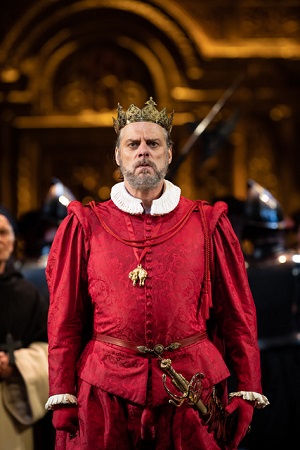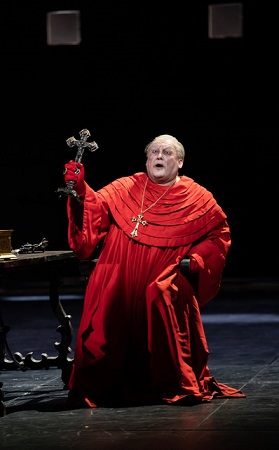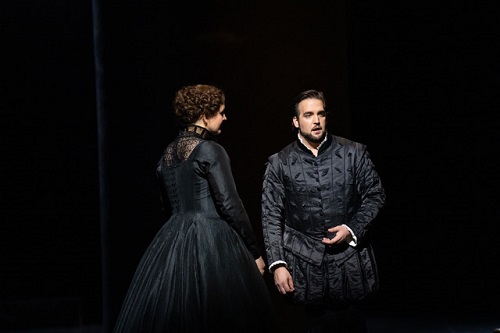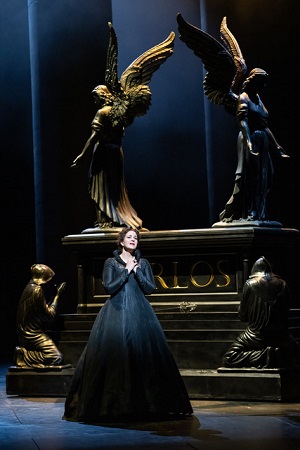Irrespective of the version of Don Carlo used, or the language in which it is sung, this is an uneven opera. The Verdi of the first two acts is, in my view, not quite the same composer of the last three and listening to this opera in Nicholas Hytner’s production (now in its third revival, this time directed by Dan Dooner) at Covent Garden I was struck by two things: one, how imperative the sense of pacing needs to be and, two, how much better directors achieve some of the themes in Don Carlo – whether it be the church, or of the abuses of power of the state – in operas like Puccini’s Tosca than they ever seem to do in productions of Don Carlo. But Don Carlo also shares with Tosca an anti-hero problem; the real heroic figures in these operas are the Philip and the Scarpia and for much the same reason we are preternaturally sympathetic to Satan. Philip II is a tour de force of characterisation.
But then perhaps what the Hytner is missing is the kind of Visconti and Velázquez inspired vision which makes Don Carlo more of its time, a more explicit period work. I was never sure with Hytner where I was (although I often knew where I wasn’t) – whatever allusions he may have been pointing to – for example, in King Philip II’s study – this was an El Escorial of suffocating bleakness and emptiness but rarely was it effective. The problem here was that his Philip, the magnificent bass John Relyea, was having none of this. His Philip was so preternaturally dominant it was impossible to escape the conclusion that his marriage to Elisabeth of France was hardly an empty one – especially when the Don Carlo here, Brian Jagde, seemed, like many sons of great kings, to walk in the shadow of his father. There have been many weak Elizabeth’s – Katia Ricciarelli comes to mind – but Lise Davidsen’s is not one of them and this also unbalances Hytner’s production. Thwarted the love may be between Elizabeth and Don Carlo, but the very idea that this is a sacrifice for state politics seems almost lost on us when there is such an imbalance in the performances.

Schiller’s play on which Verdi based Don Carlo is complex; the plot is an uneasy mix of family saga and political drama. Family tensions are a mirror to tensions in Spain itself; a tyrannical father is also a repressive, but strong, ruler. Don Carlo, however, is something of a radically redrawn figure. More benevolently viewed than his father in the Schiller version, history may well have concluded (had he lived beyond the age of twenty-three) that he would have been worse than Ivan the Terrible. During his own lifetime, Schiller was an onlooker to a period of European history which embraced revolution. Don Carlo, in some ways, goes against many of Schiller’s own progressive views – this is an opera which is anti-enlightenment (Philip versus Posa), and which propels the ideas of vested interests, and the repression that is needed to obtain them. Church and state merge in the terror of the Inquisition and the character of the Cardinal Inquisitor – a figure in this production who may be crippled with age but who, none the less, imposes his will on everyone, including Philip. Hope is defined in the character of Don Carlo – but he is destroyed by his father’s suspicions of his hopeless infatuation and love for Elizabeth of Valois, just as he is a man with obsessions which are myopic. By the time he sees what he needs to do it is too late. Grapple as you might with Hytner, hope relies almost entirely on the Don Carlo we get and perhaps this is where Hytner goes wrong. The vast monument to Carlos V is rather more than the sum of its parts, unfortunately; it risks becoming the monument to the failure of the Don Carlo who stands in front of it.

Brian Jagde so well conveyed this rather miserable side of Don Carlo that beside Luca Micheletti’s Rodrigo humanity and wisdom seemed entirely misplaced. He seemed lost as he stood in front of the tomb of his grandfather, the emperor Carlos V. Hytner does nothing to make Jagde’s Don Carlo a more heroic figure and one quickly loses any real sense of empathy with him. Perhaps we do want Philip to crush him – perhaps we want more of the historical Don Carlo, too.
Hytner might, in my view, have gone awry with how he perceives the setting of the opera but he clearly helps his Philip exert his credentials as a despotic ruler. Philip is a complicated character. For everything that denotes him as a powerful ruler, there is something which suggests the opposite. I would, for example, rather see the magnificent cello solo (played with exquisite beauty of tone here by Richard Harwood) which accompanies his great Act IV aria ‘Ella giammai m’amò’ as less a view on his grief about his empty marriage to Elizabeth and more as a simpler suggestion of Philip’s well-known preference for loneliness. If there is absolutely no dimension to Don Carlo, Philip is the fully developed Verdian character. Despair, isolation and repression aren’t signs of weakness for this Philip – they are self-imposed, as wired to his personality as the more destructive parts are. The clash with the Great Inquisitor – in perhaps the opera’s most dramatic scene – was superb, too. John Relyea was extraordinarily powerful here, but so fully-rounded had his singing been that the portrayal of this Philip that emerged was one of astonishing depth. The Cardinal Inquisitor was stupendously sung by Taras Shtonda – his crippled, blind, tortured body suggesting neither the resounding power of the voice, nor the declining terror and stretch of his influence were weakened in either instance.*

Lise Davidsen’s Elizabeth of Valois was a rather more dramatic one than one usually hears. Such was the stentorian power of her voice, the thrilling assuredness of her high notes, and the ravishing sensuousness of the lines, it was difficult to suspend belief in some quarters when we needed to do that. Jagde’s Don Carlo had hardly sung the most dreamy or sensitive of arias in the Fontainebleau Forest (appropriately wooden trees, perhaps) so it was also unconvincing when they first met and declared their feelings for each other. Perhaps because Davidsen is nothing other than regal on stage, one never really felt she had accepted her marriage to Philip II under duress. Nothing sparkled in the Act II duet between Elizabeth and Carlo, ‘Io vengo a domandar’; their farewell, ‘Ma lassiú ci vedremo’ came as a moment of relief. Davidsen achieved some gorgeous threads of delicate phrasing here, but all hope in the music came to nothing through their chemistry.

Intriguingly, where relationships should have been working towards a resolution of happiness they often weren’t. More convincing on stage were the Don Carlo/Rodrigo duet – a superb ‘Dio, che nell’alma infondere’ – where Jagde and Luca Micheletti established a kind of brotherhood as they united in their ambitions to advance Flemish freedom. Likewise, more electricity was generated between Elizabeth and Princess Eboli (Yulia Matochkina) – a riveting, if rather overwhelming, Veil Song here – but undisguised hatred at the end as Elizabeth sends Eboli into exile. Most convincing all was John Relyea’s magnificent Philip II fighting entirely with just himself and God. This was a great painting, a portrait, of a performance.
Bertrand de Billy – who has form with this opera, not least in Salzburg – gave an uneven reading of the score. Acts I and II were too ponderous for my taste; a lack of drive and momentum made the pacing of the score seem sluggish. Much better was Act III, which seemed to belt along with considerable fizz. Acts IV and V were fine, too – although Verdi’s longest opera did, indeed, seem Verdi’s longest opera by some distance. The playing of the orchestra was first rate and perhaps no better than in Act IV – but this is Verdi at his very greatest. The lugubrious Inquisitor’s music was superlatively done. Choral scenes, were precisely sung, lacking the messiness which was often a problem with the production on stage.
The revival doesn’t resolve the problems of the original Hytner production – awkward scene changes still have action happening in front of the curtains, for example – nor, crucially, does it help Verdi if the casting is so out of kilter as it often was here. Perhaps Verdi (or Schiller) were simply wrong. When you have a Don Carlo and the Philip II is the clear star of the show just call the opera Philip II.
Marc Bridle
Giuseppe Verdi, Don Carlo (1886 version, sung in Italian)
Don Carlo – Brian Jagde, Elizabeth of Valois – Lise Davidsen, Philip II – John Relyea, Rodrigo, Maquis of Posa – Luca Micheletti, Princess Eboli – Yulia Matochkina, Grand Inquisitor – Taras Shtondha, Tebaldo – Ella Taylor, Carlos V – Alexander Köpeczi, Count of Lerma – Michael Gibson, The Countess of Arembers – Rosalind Waters The Priest Inquisitor – David Fell, Flemish Deputies – Josef Jeongmeen Ahn, Dan D’Souza, Matthew Durkan, Felix Kemp, Jihoon Kim, Simon Wallfisch; Director – Nicholas Hytner, Revival Director – Dan Hooley, Conductor – Bertand de Billy, Designer – Bob Crowley, Lighting Designer – Mark Henderson, Movement Director – Scarlett Mackmin, Fight Director – Terry King, Royal Opera Chorus, William Spaulding – Chorus Director, Orchestra of the Royal Opera House
Royal Opera House, Covent Garden, London; Monday 3rd July 2023.]
ABOVE: ROH Don Carlo © Bill Cooper